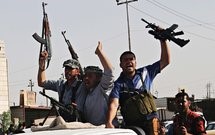 The rise of ISIL and the security threat it poses to the region provides one of the rare opportunities for the erstwhile rivals, Iran and US to cooperate. While they are long-time antagonists, their interests now appear to intersect in Iraq, where neither side wish to see the Shia-led government lose more territory to ISIL.
The rise of ISIL and the security threat it poses to the region provides one of the rare opportunities for the erstwhile rivals, Iran and US to cooperate. While they are long-time antagonists, their interests now appear to intersect in Iraq, where neither side wish to see the Shia-led government lose more territory to ISIL.
Now the next big question is how long the two can sustain the partnership keeping in mind the inherent challenges. It is a complex situation where enemies of enemies aren’t friends, nor are friends of enemies, enemies.
Iran, despite being majorly involved in Syria and Iraq, was kept out of the Paris conference which was held for planning actions against the ISIL threat. However the recent statements by US Secretary of State John Kerry has hinted at a more accommodative approach towards Iran in its fight against the ISIL.
In case of Iraq, both the US and Iran have been supporting the Iraqi government forces but by different means. US is involved in air strikes against the ISIL and also arming the government and Kurdish forces whereas Iran has been funding and rearming the local Shia militias to assist the Iraqi government forces, against the ISIL. The Iranian move greatly increased the threat of widening sectarian rift and at the same time portrayed its continued influence in Iraq. This has fuelled paranoia among the neighbouring Sunni states.
The US by all means seeks to gain the support of Sunni regional powers like Saudi Arabia, Turkey and Egypt along with others to assist the Iraqi government. It does not want itself to be portrayed as a purely Shiite supportive force and get dragged into the sectarian mess.
Thus the next great challenge is how the US and Iran coordinate their strategies in Iraq against the ISIL. While Iran would seek increased support to the Shia militias, Sunni allies like Saudi Arabia will be strongly opposed to any such venture, drawing in their sectarian differences. This might in all probability weaken the alliance.
Secondly, for the time being even if it is assumed that their interests may converge in Iraq, the main bone of contention is Syria. When it comes to the ISIL in Syria, both Iran and US are not on the same page. Syria's Ambassador to the UN Bashar Jaafari has criticised the West for not addressing the issue of ISIL in Syria. He said the Syrian government should be not be ignored when dealing with the ISIL threat. "Kerry did not address the situation in Syria. He exclusively spoke about Iraq," Jaafari said.
US intend to arm and train the ‘moderate forces’ in Syria which will act as foot soldiers for the US; Washington aims to degrade the ISIL war fighting capabilities and at the same time attempt to bring down the Tehran-friendly regime of Assad. This is detrimental to the Iranian interests in the region and hence it actively opposes it. Tehran has good reasons to believe the war against ISIL is a renewed attempt to facilitate regime change in Syria. The regional Sunni allies of the US like Saudi Arabia, Qatar and UAE on the other hand overwhelmingly support the venture as their interests converge. This clearly highlights the duplicity of American commitments in the region. This will be the next great challenge the US faces in order to convince Iran on the genuineness of its intentions against ISIL.
Lastly, Iran is yet to confirm about the kind of assistance it is going to lend to the US against ISIL. It has also hinted at the conditional assistance, meaning that it will assist the US against the ISIL only if the US makes certain credible concessions on the nuclear issue.Thus Tehran intends to use its support to the US as a bargaining chip. It now depends on the US if it is willing to pay the price for the Iranian assistance or is it going to negotiate with Iran on the same.
Despite the fact that a partnership between the US and Iran is warranted against the present and ever growing threat of the ISIL the domestic, regional and strategic interests of the two pose some serious challenges to the sustainability of such a partnership.
By Special Arrangement with The Centre For Land Warfare Studies (CLAWS) (http://www.claws.in)